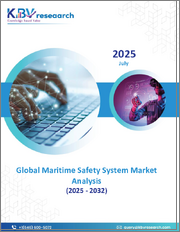
|
시장보고서
상품코드
1535658
해상 보안 시스템 시장 규모 : 용도별, 컴포넌트별, 시스템별, 최종사용자별, 예측(2024-2032년)Maritime Safety System Market Size - By Applications (Port & Harbor Safety, Coastal Surveillance, Offshore & Deep-sea Activities, Search & Rescue Operations, Environmental Protection), By Component, By System, By End User & Forecast, 2024 - 2032 |
||||||
해상 보안 시스템 시장 규모는 해상 교통량의 증가와 이에 따른 안전 대책 강화의 필요성에 의해 2024-2032년 CAGR 6% 이상을 기록할 것으로 추정됩니다.
세계 무역이 확대됨에 따라 화물선과 여객선의 운항량이 증가함에 따라 해상 안전에 대한 관심이 높아지고 있습니다. 자동인식시스템(AIS), 레이더 시스템, 위성항법시스템(GNSS) 등 기술의 도입은 실시간 추적, 충돌방지, 항해 개선에 필수적입니다. 예를 들어 2022년 5월, 회원국들이 불법 어업을 감독하고, 암흑 해운을 감시하며, 기타 전술적 수준의 작전을 처리할 수 있도록 하는 해양 안보 파트너십을 포함한 여러 구상을 발표했습니다.
또한 각국 정부와 국제해사기구는 새로운 위험과 기술 발전에 대응하기 위해 안전 기준과 프로토콜을 지속적으로 업데이트하고 있습니다. 국제해사기구(IMO)의 SOLAS(해상인명안전협약), MARPOL(해양오염방지협약) 등의 규제는 선박의 안전과 환경 보호를 강화하기 위해 첨단 해양 안전 시스템 도입을 더욱 촉진하고 있습니다.
컴포넌트별로 보면 실시간 모니터링, 데이터 분석 및 의사결정을 위한 고급 솔루션에 대한 수요로 인해 소프트웨어 부문이 2024-2032년 해상 보안 시스템 시장 규모를 견인할 것으로 예상됩니다. 통합 브리지 시스템(IBS), 전자해도 표시 정보 시스템(ECDIS), 해상 감시 시스템(MSS)과 같은 첨단 소프트웨어 용도도 선박의 상황 인식과 운항 효율성을 높이기 위해 인기를 끌고 있습니다.
용도별로는 해상 국경 및 연안 지역의 안전과 보안에 대한 관심이 높아짐에 따라 해안 감시 분야의 해양 보안 시스템 시장이 2032년까지 강력한 CAGR을 보일 것으로 예상됩니다. 레이더, 소나, 첨단 영상 기술을 포함한 연안 감시 시스템은 연안 해역을 종합적으로 모니터링하고 불법 어업, 밀수, 해적 행위와 같은 위협을 감지하고 대응합니다.
북미 해양 보안 시스템 산업은 2024-2032년 빠르게 성장할 것으로 전망됩니다. 미국과 캐나다는 주요인프라를 보호하고 해상 운송에 의존하는 경제 활동을 지원하기 위해 항만 시설, 해안 보안 조치 및 해상 감시 능력 향상에 많은 투자를 하고 있으며, 이는 이 지역 시장 성장에 박차를 가하고 있습니다.
목차
제1장 조사 방법과 조사 범위
제2장 개요
제3장 업계 인사이트
- 에코시스템 분석
- 공급업체 상황
- 하드웨어 프로바이더
- 소프트웨어 프로바이더
- 용기 제조업체
- 최종사용자
- 이익률 분석
- 기술과 혁신 전망
- 특허 분석
- 주요 뉴스 & 구상
- 규제 상황
- 영향요인
- 촉진요인
- 해상 무역량의 증가에 수반하여 첨단 안전 시스템이 필요해지고 있다.
- 시장 기술 진보의 증가
- 해상 범죄에 대항할 필요성에 의해 강고한 해상 안전의 수요가 높아진다.
- 엄격한 국제 해상 안전
- 해상 보안 인프라에 대한 고액 투자
- 업계의 잠재적 리스크 & 과제
- 업계의 잠재적 리스크 & 과제
- 첨단 안전 시스템을 도입하기 위한 고액의 초기 비용
- 첨단 안전 시스템 도입을 위한 비용
- 촉진요인
- 성장 가능성 분석
- Porter의 산업 분석
- PESTEL 분석
제4장 경쟁 구도
- 서론
- 기업 점유율 분석
- 경쟁 포지셔닝 매트릭스
- 전략 전망 매트릭스
제5장 시장 추산·예측 : 컴포넌트별, 2021-2032년
- 주요 동향
- 하드웨어
- 센서
- 통신 시스템
- 포지셔닝 & 내비게이션 시스템
- 자동 식별 시스템
- 표시 시스템
- 기타
- 소프트웨어
- 교통 관리 소프트웨어
- 내비게이션 소프트웨어
- 데이터 처리·분석 소프트웨어
- 통신 소프트웨어
- 기타
- 서비스
- 트레이닝 & 컨설팅
- 정비 & 지원
- 도입·통합
제6장 시장 추산·예측 : 시스템별, 2021-2032년
- 주요 동향
- 선박 보안 통보 시스템
- 선박 자동 식별 시스템(AIS)
- 세계 해난 안전 시스템(GMDSS)
- 장거리 추적 식별(LRIT) 시스템
- 선박 감시 관리 시스템
- 기타
제7장 시장 추산·예측 : 용도별, 2021-2032년
- 주요 동향
- 항만 안전
- 하드웨어
- 소프트웨어
- 서비스
- 연안 감시
- 하드웨어
- 소프트웨어
- 서비스
- 오프쇼어 & 심해 활동
- 하드웨어
- 소프트웨어
- 서비스
- 수색·구조 활동
- 하드웨어
- 소프트웨어
- 서비스
- 환경보호
- 하드웨어
- 소프트웨어
- 서비스
- 기타
- 하드웨어
- 소프트웨어
- 서비스
제8장 시장 추산·예측 : 최종사용자별, 2021-2032년
- 주요 동향
- 정부·방위
- 석유 및 가스
- 해양·건설
- 해운·운송
- 기타
제9장 시장 추산·예측 : 지역별, 2021-2032년
- 주요 동향
- 북미
- 미국
- 캐나다
- 유럽
- 영국
- 독일
- 프랑스
- 이탈리아
- 러시아
- 스페인
- 기타 유럽
- 아시아태평양
- 중국
- 일본
- 인도
- 한국
- 호주
- 동남아시아
- 기타 아시아태평양
- 라틴아메리카
- 브라질
- 멕시코
- 아르헨티나
- 기타 라틴아메리카
- 중동 및 아프리카
- UAE
- 남아프리카공화국
- 사우디아라비아
- 기타 중동 및 아프리카
제10장 기업 개요
- Cobham Plc
- Consilium AB
- Elbit Systems Ltd.
- Furuno Electric Co., Ltd.
- Garmin Ltd.
- Iridium Communications Inc.
- Jeppesen
- Kelvin Hughes
- Kongsberg Gruppen
- Lockheed Martin Corporation
- Navico
- Northrop Grumman
- Raytheon Anschutz
- Saab
- Sperry Marine
- SRT Marine Systems
- Thales Group
- Tokyo Keiki Inc.
- Transas
- Wartsila Corporation
Maritime Safety System Market size is estimated to register over 6% CAGR between 2024 and 2032 driven by the increasing maritime traffic and the subsequent need for enhanced safety measures. With the expansion of global trade, the volume of cargo ships and passenger vessels on the oceans has increased, leading to the heightened focus on maritime safety. The implementation of technologies, such as Automatic Identification Systems (AIS), radar systems, and Global Navigation Satellite Systems (GNSS) have grown critical for real-time tracking, collision avoidance, and improved navigation. For instance, in May 2022, Quad leaders unveiled several initiatives, including a maritime security partnership, which enabled member countries to oversee illegal fishing, monitor dark shipping, and address other tactical-level operations.
Moreover, governments and international maritime organizations are continually updating safety standards and protocols to address the emerging risks and technological advancements. Regulations, such as the International Maritime Organization's (IMO) SOLAS (Safety of Life at Sea) convention and the MARPOL (Marine Pollution) convention are further pushing the adoption of advanced maritime safety systems to enhance vessel safety and environmental protection.
The overall industry is classified into component, system, application, end user, and region.
Based on component, the maritime safety system market size from the software segment will gain notable traction during 2024-2032 backed by the need for sophisticated solutions for real-time monitoring, data analysis, and decision-making. Advanced software applications, such as Integrated Bridge Systems (IBS), Electronic Chart Display and Information Systems (ECDIS), and Maritime Surveillance Systems (MSS) are also gaining popularity to enhance situational awareness and operational efficiency on vessels.
In terms of application, the maritime safety system market from the coastal surveillance segment will witness strong CAGR through 2032 owing to the growing focus on security and safety of maritime borders and coastal areas. Coastal surveillance systems, including radar, sonar, and advanced imaging technologies provide comprehensive monitoring of coastal waters to detect and respond to threats, such as illegal fishing, smuggling, and maritime piracy.
North America maritime safety system industry will witness rapid expansion over 2024-2032 attributed to the strategic focus on enhancing maritime infrastructure and ensuring national security. The U.S. and Canada are investing heavily in upgrading their port facilities, coastal security measures, and maritime surveillance capabilities to protect critical infrastructure and support economic activities reliant on maritime transport, adding to the regional market growth.
Table of Contents
Chapter 1 Methodology & Scope
- 1.1 Research design
- 1.1.1 Research approach
- 1.1.2 Data collection methods
- 1.2 Base estimates and calculations
- 1.2.1 Base year calculation
- 1.2.2 Key trends for market estimates
- 1.3 Forecast model
- 1.4 Primary research & validation
- 1.4.1 Primary sources
- 1.4.2 Data mining sources
- 1.5 Market definitions
Chapter 2 Executive Summary
- 2.1 Industry 360° synopsis, 2021 - 2032
Chapter 3 Industry Insights
- 3.1 Industry ecosystem analysis
- 3.2 Supplier landscape
- 3.2.1 Hardware providers
- 3.2.2 Software providers
- 3.2.3 Vessel manufacturers
- 3.2.4 End-users
- 3.3 Profit margin analysis
- 3.4 Technology & innovation landscape
- 3.5 Patent analysis
- 3.6 Key news & initiatives
- 3.7 Regulatory landscape
- 3.8 Impact forces
- 3.8.1 Growth drivers
- 3.8.1.1 The rise in maritime trade volume necessitates advanced safety systems
- 3.8.1.2 Rising technological advancements in the market
- 3.8.1.3 The need to combat maritime crimes boosts demand for robust maritime safety
- 3.8.1.4 Stringent international maritime safety
- 3.8.1.5 Significant investments in maritime security infrastructure
- 3.8.1.6 Industry pitfalls & challenges
- 3.8.2 Industry pitfalls & challenges
- 3.8.2.1 High initial costs for implementing advanced safety systems
- 3.8.2.2 Costs for implementing advanced safety systems
- 3.8.1 Growth drivers
- 3.9 Growth potential analysis
- 3.10 Porter's analysis
- 3.11 PESTEL analysis
Chapter 4 Competitive Landscape, 2023
- 4.1 Introduction
- 4.2 Company market share analysis
- 4.3 Competitive positioning matrix
- 4.4 Strategic outlook matrix
Chapter 5 Market Estimates & Forecast, By Component, 2021 - 2032 ($Mn)
- 5.1 Key trends
- 5.2 Hardware
- 5.2.1 Sensors
- 5.2.2 Communication systems
- 5.2.3 Positioning & navigation systems
- 5.2.4 Automatic identification system
- 5.2.5 Display systems
- 5.2.6 Others
- 5.3 Software
- 5.3.1 Traffic management software
- 5.3.2 Navigation software
- 5.3.3 Data processing & analytics software
- 5.3.4 Communication software
- 5.3.5 Others
- 5.4 Services
- 5.4.1 Training & consultation
- 5.4.2 Maintenance & support
- 5.5 Installation & integration
Chapter 6 Market Estimates & Forecast, By System, 2021 - 2032 ($Mn)
- 6.1 Key trends
- 6.2 Ship security reporting system
- 6.3 Automatic Identification system (AIS)
- 6.4 Global maritime distress safety system (GMDSS)
- 6.5 Long range tracking and identification (LRIT) System
- 6.6 Vessel monitoring and management system
- 6.6.1 Others
Chapter 7 Market Estimates & Forecast, By Application, 2021 - 2032 ($Mn)
- 7.1 Key trends
- 7.2 Port & harbor safety
- 7.2.1 Hardware
- 7.2.2 Software
- 7.2.3 Services
- 7.3 Coastal surveillance
- 7.3.1 Hardware
- 7.3.2 Software
- 7.3.3 Services
- 7.4 Offshore & deep-sea activities
- 7.4.1 Hardware
- 7.4.2 Software
- 7.4.3 Services
- 7.5 Search & rescue operations
- 7.5.1 Hardware
- 7.5.2 Software
- 7.5.3 Services
- 7.6 Environmental protection
- 7.6.1 Hardware
- 7.6.2 Software
- 7.6.3 Services
- 7.7 Others
- 7.7.1 Hardware
- 7.7.2 Software
- 7.7.3 Services
Chapter 8 Market Estimates & Forecast, By End User, 2021 - 2032 ($Mn)
- 8.1 Key trends
- 8.2 Government & defense
- 8.3 Oil & gas
- 8.4 Marine & construction
- 8.5 Shipping & transportation
- 8.6 Others
Chapter 9 Market Estimates & Forecast, By Region, 2021 - 2032 ($Mn)
- 9.1 Key trends
- 9.2 North America
- 9.2.1 U.S.
- 9.2.2 Canada
- 9.3 Europe
- 9.3.1 UK
- 9.3.2 Germany
- 9.3.3 France
- 9.3.4 Italy
- 9.3.5 Russia
- 9.3.6 Spain
- 9.3.7 Rest of Europe
- 9.4 Asia Pacific
- 9.4.1 China
- 9.4.2 Japan
- 9.4.3 India
- 9.4.4 South Korea
- 9.4.5 Australia
- 9.4.6 Southeast Asia
- 9.4.7 Rest of Asia Pacific
- 9.5 Latin America
- 9.5.1 Brazil
- 9.5.2 Mexico
- 9.5.3 Argentina
- 9.5.4 Rest of Latin America
- 9.6 MEA
- 9.6.1 UAE
- 9.6.2 South Africa
- 9.6.3 Saudi Arabia
- 9.6.4 Rest of MEA
Chapter 10 Company Profiles
- 10.1 Cobham Plc
- 10.2 Consilium AB
- 10.3 Elbit Systems Ltd.
- 10.4 Furuno Electric Co., Ltd.
- 10.5 Garmin Ltd.
- 10.6 Iridium Communications Inc.
- 10.7 Jeppesen
- 10.8 Kelvin Hughes
- 10.9 Kongsberg Gruppen
- 10.10 Lockheed Martin Corporation
- 10.11 Navico
- 10.12 Northrop Grumman
- 10.13 Raytheon Anschutz
- 10.14 Saab
- 10.15 Sperry Marine
- 10.16 SRT Marine Systems
- 10.17 Thales Group
- 10.18 Tokyo Keiki Inc.
- 10.19 Transas
- 10.20 Wartsila Corporation














